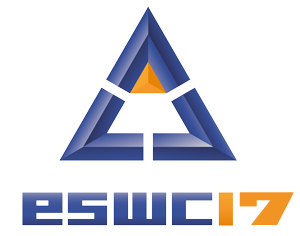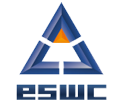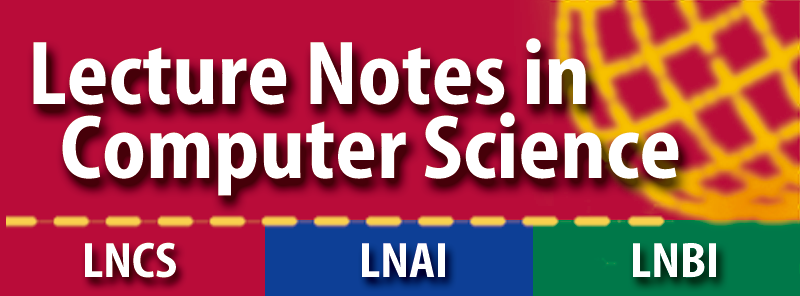Call For Posters and Demos
The posters and demos track of ESWC provides a forum for late-breaking results, on-going research projects, and innovative ideas, as well as prototypes of semantic technologies and their applications in various domains. Submissions to the posters and demos track may cover all areas of Semantic Web research and applications, such as Linked Data and Knowledge Graphs, Ontologies, Reasoning, Natural Language Processing, Machine Learning, Information Retrieval, Data Quality and Data Integration, and Semantic Data Management, as well as applications from Life Sciences, eGovernment, Business, Manufacturing, eScience, Emergency and Crisis Management, etc. Posters and demos will be presented in a separate, interactive session, providing the opportunity for engaging in discussions and direct exchange.
Prize and minute madness
Accepted posters and demos will be included into the “minute madness” pitch introducing the poster and demo session during the conference. They will also be enrolled into the competition for the best poster and demo award of ESWC 2017. More information about the “minute madness” material and program will be provided to the authors of accepted submissions.
Submission Guidelines
Authors must submit a short paper (Springer LNCS style, https://www.springer.com/computer/lncs?SGWID=0-164-6-793341-0). Poster submissions are at most four pages long, demo submissions are at most five pages long.
Poster submissions are expected to contain a short abstract for evaluation, while demonstration track submissions must additionally provide a textual description of the demonstration to be given at the conference (which may include screenshots and must include either a link to the online demo or a video presenting it). The submissions must clearly demonstrate relevance to the Semantic Web and the topics of interest of ESWC 2017. Decisions about acceptance will be based on relevance to the Semantic Web, originality, potential significance, topicality, and clarity. Papers that exceed the given page length or do not follow the LNCS guidelines will be rejected without review. Furthermore, double submissions to other any conferences, workshops, or tracks of ESWC will be rejected. Posters and demonstrations accompanying an accepted research or in-use/industrial track paper must be marked as such and provide an explanation of the additional value of the P&D submission. Submissions must be uploaded on Easychair selecting the ESWC 2017 Posters and Demos Track at https://easychair.org/conferences/?conf=eswc2017pd.
Important Dates
Submission Deadline: March 13, 2017
Notification of Acceptance: April 7, 2016
Camera-Ready Paper: April 30, 2016
All deadlines are intended to be 23:59 HST (Hawaii Time).
Important Notes
Poster papers will appear in supplementary post-conference proceedings to be published by Springer in the series Lecture Notes in Computer Science (LNCS).
Participants with an accepted poster or demonstration must register for the conference and present their work during the Poster and Demos Session. Space will be allocated for each participant. In case of any special requirements, the organizers should be contacted well in advance of the conference.
Poster and Demo Chairs
Katja Hose (University of Aalborg, Denmark)
Heiko Paulheim (University of Mannheim, Germany)
Program Committee
Nitish Aggarwal, Insight-Centre NUI Galway
Asan Agibetov, CNR-IMATI
Henning Agt-Rickauer, HPI
Céline Alec, LRI, Univ. Paris-Sud, CNRS, Université Paris-Saclay
Grigoris Antoniou, University of Huddersfield
Luigi Asprino, University of Bologna and STLab (ISTC-CNR)
Judie Attard, University of Bonn
Martin Atzmueller, University of Kassel
Payam Barnaghi, University of Surrey
Ciro Baron Neto, University of Leipzig
Caroline Barriere, CRIM
Pierpaolo Basile, Dipartimento di Informatica - University of Bari
Davide Buscaldi, LIPN, Université Paris 13, Sorbonne Paris Cité
Amparo E. Cano, Knowledge Media Institute, The Open University
Miguel Ceriani, Sapienza - University of Rome
Michelle Cheatham, Wright State University
Diego Collarana, Enterprise Information System (EIS)
Ronald Cornet, Academic Medical Center - Universiteit van Amsterdam
Claudia D'Amato, University of Bari
Mathieu D'Aquin, Knowledge Media Institute, the Open University
Brian Davis, Insight Centre for Data Analytics, Galway
Ernesto William De Luca, Georg-Eckert-Institute – Leibniz-Institute for international Textbook Research
Jeremy Debattista, University of Bonn
Stefan Dietze, L3S Research Center
Zlatan Dragisic, Linköping University
Mauro Dragoni, Fondazione Bruno Kessler - FBK-IRST
Anca Dumitrache, VU University Amsterdam
Daniel Faria, Instituto Gulbenkian de Ciência
Catherine Faron Zucker, Université Nice Sophia Antipolis
Agata Filipowska, Department of Information Systems, Poznan University of Economics
George H. L. Fletcher, Eindhoven University of Technology
Flavius Frasincar, Erasmus University Rotterdam
Michael Färber, KIT, Institute AIFB
Luis Galárraga, Aalborg University
Anna Lisa Gentile, University of Mannheim
Rafael S Gonçalves, Stanford University
Giovanna Guerrini, DISI- University of Genova
Peter Haase, metaphacts
Jörn Hees, University of Kaiserslautern
Sven Hertling, DFKI
Daniel Hienert, GESIS - Leibniz Institute for the Social Sciences
Robert Hoehndorf, King Abdullah University of Science and Technology
Matthew Horridge, Stanford University
Tomas Horvath, Eötvös Loránd University
Valentina Ivanova, Linköping University
Ashutosh Jadhav, IBM Research
Anja Jentzsch, Hasso Plattner Institut
Ernesto Jimenez-Ruiz, University of Oxford
Anna Jordanous, University of Kent
Takahiro Kawamura, Japan Science and Technology Agency
Tomas Kliegr, University of Economics, Prague
Kouji Kozaki, I.S.I.R., Osaka University
Patrick Lambrix, Linköping University
Steffen Lohmann, Fraunhofer IAIS
Ioanna Lytra, Enterprise Information Systems, Applied Computer Science, University of Bonn
John P. McCae, National University of Ireland, Galway
Gerard de Melo, Rutgers University
Aditya Mogadala, KIT
Stefano Montanelli, Università degli Studi di Milano
Varish Mulwad, GE Global Research
Matthias Nickles, National University of Ireland, Galway, Digital Enterprise Research Institute
Vit Novacek, DERI, National University of Ireland, Galway
Andrea Giovanni Nuzzolese, STLab, ISTC-CNR
Fabrizio Orlandi, University of Bonn
Francesco Osborne, KMi, the Open University
Silvio Peroni, University of Bologna
Rafael Peñaloza, Free University of Bozen-Bolzano
Antonella Poggi, SAPIENZA Università di Roma - Dipartimento di Informatica e Sistemistica A. Ruberti
Simone Paolo Ponzetto, University of Mannheim
Jędrzej Potoniec, Poznan University of Technology
María Poveda-Villalón, Ontology Engineering Group. Departamento de Inteligencia Artificial. Universidad Politécnica de Madrid
David Pride, KMi, the Open University
Freddy Priyatna, Ontology Engineering Group
Gustavo Publio, University of Leipzig
Alessandro Raganato, Sapienza University of Rome
Achim Rettinger, Karlsruhe Institute of Technology
Martin Riedl, University of Hamburg
Petar Ristoski, University of Mannheim
Giuseppe Rizzo, ISMB
Alessandro Russo, STLab, ISTC-CNR
Idafen Santana-Pérez, Ontology Engineering Group - Universidad Politécnica de Madrid
Felix Sasaki, W3C
Kai-Uwe Sattler, TU Ilmenau
Stefan Schlobach, Vrije Universiteit Amsterdam
Michael Schmidt, metaphacts GmbH
Jodi Schneider, University of Pittsburgh
Barış Sertkaya, Frankfurt University of Applied Sciences
Vinay Setty, Aalborg University
Pavel Shvaiko, Informatica Trentina
Kuldeep Singh, Fraunhofer IAIS
Jennifer Sleeman, University of Maryland Baltimore County
Monika Solanki, University of Oxford
Timo Stegemann, University of Duisburg-Essen
Thomas Steiner, Google
Thepchai Supnithi, NECTEC
Steffen Thoma, KIT
Ilaria Tiddi, Knowledge Media Institute - The Open University
Tabea Tietz, Hasso-Plattner-Institut
Anna Tordai, Elsevier B.V.
Raphaël Troncy, EURECOM
Ricardo Usbeck, University of Leipzig
Marieke Van Erp, VU University Amsterdam
Ruben Verborgh, Ghent University – imec
Maria Esther Vidal, Universidad Simon Bolivar, Dept. Computer Science
Sebastian Walter, Semalytix GmbH
Kewen Wang, Griffith University
Krzysztof Wecel, Poznan University of Economics
Takahira Yamaguchi, Keio University
Ondřej Zamazal, University of Economics, Prague





